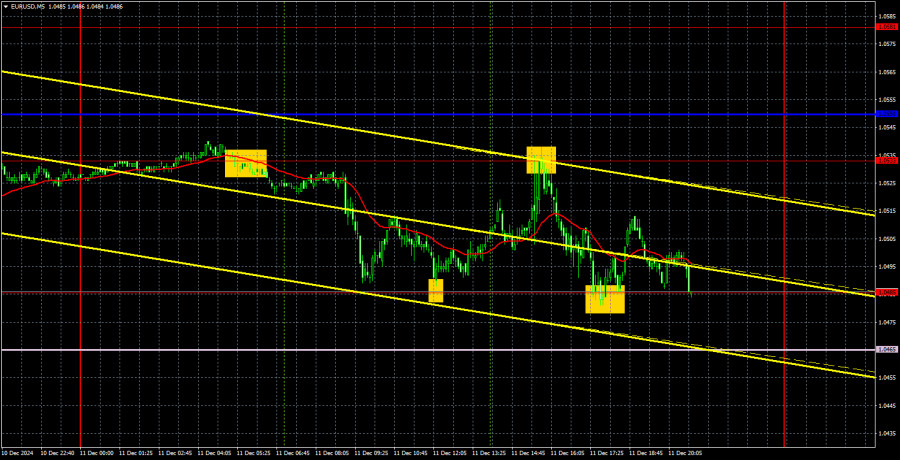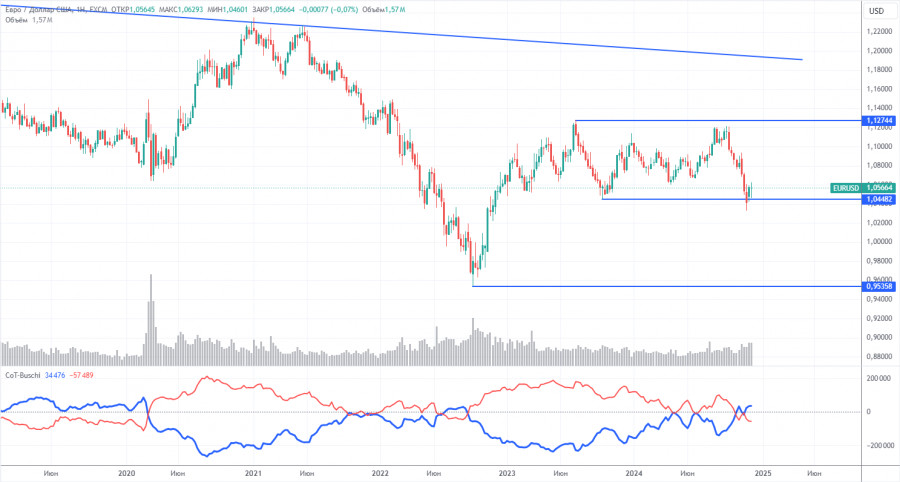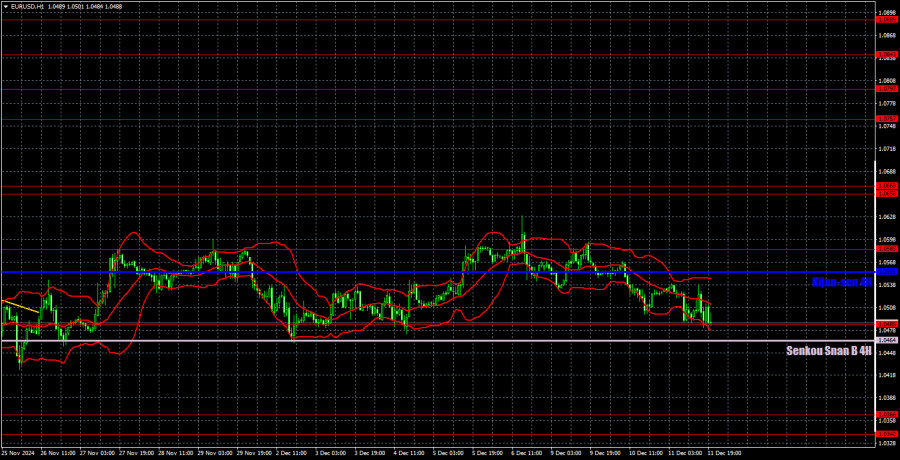EUR/USD 5-Minute Analysis

On Wednesday, the EUR/USD pair continued to sluggishly roll down within the horizontal channel, which it has been for several weeks. This horizontal channel is 1.0464-1.0585. After the price once again bounced from the upper boundary of this channel, it dropped to its lower boundary. Thus, from the technical point of view, we saw almost perfect movement, though flat. Yesterday, November's most important inflation report was published in the U.S., on which the Federal Reserve's decision in December largely depended. However, this report did not answer what the U.S. central bank will do with the rate. Inflation accelerated, but it accelerated strictly within the forecast. Core inflation did not change, which also aligned with experts' forecasts. Thus, at the moment, the Fed has not gotten closer or further to another easing of monetary policy. The rate will likely be reduced, as the labor market showed good results in November, and inflation accelerated slightly. However, the Fed will likely pause if the next inflation report shows acceleration again. We believe the dollar will continue to strengthen slowly or quickly - it doesn't matter.
We want to remind you that the downtrend started three months ago and remains intact in the medium term. The movement that we have seen in recent weeks is a correction. Therefore, we expect the correction to be completed, the price to consolidate below the Senkou Span B line, and the decline to resume. At least four signals were formed yesterday on the 5-minute TF. The price alternately worked and bounced from the level of 1.0485 and 1.0533. Thus, it was possible to open four trades, three of which were profitable.
COT Report

The latest Commitment of Traders (COT) report is dated December 3. As shown in the chart, the net position of non-commercial traders remains "bullish," though bears are gradually gaining ground. About six weeks ago, professional traders significantly increased their short positions, turning the net position negative for the first time in a long while. This indicates that the euro is now being sold more frequently than bought.
Fundamentally, there are no clear reasons for euro appreciation. Technically, the pair remains in a consolidation zone or a flat trend. On the weekly chart, EUR/USD has been trading between 1.0448 and 1.1274 since December 2022, making further declines more likely. A breakout below 1.0448 could open new downside potential for the euro.
The red and blue lines have crossed, signaling a bearish market trend. During the latest reporting week, the number of long positions among the "non-commercial" group increased by 11,400, while short positions rose by 12,800. As a result, the net position decreased by 1,400.
EUR/USD 1-Hour Analysis

On the hourly timeframe, the pair continues to correct and remains within a visible horizontal channel. The correction is complex and slow, as we anticipated. We still believe there are no grounds for significant euro strength, so we will wait for the correction to end and for the pair to resume its decline toward price parity. For instance, a break below the Senkou Span B line would signal a potential resumption of the downtrend.
On December 12, we highlight the following levels for trading - 1.0269, 1.0340-1.0366, 1.0485, 1.0585, 1.0658-1.0669, 1.0757, 1.0797, 1.0843, 1.0889, 1.0935, as well as the Senkou Span B (1.0464) and Kijun-sen (1.0555) lines. The Ichimoku indicator lines may shift during the day, so traders should account for these changes when identifying signals. Set Stop Loss orders to break even if the price moves 15 pips in the correct direction. This helps protect against potential losses if the signal turns out to be false.
On Thursday, the European Central Bank meeting will be held in the European Union, where there is a 99% probability that the rates will be lowered. The market has probably already worked out this event, but according to our analysis, the euro should still resume its decline. In the U.S., the relatively important Producer Price Index will be published.
Illustration Explanations:
- Support and Resistance Levels (thick red lines): Key areas where price movement might stall. Not sources of trading signals.
- Kijun-sen and Senkou Span B Lines: Ichimoku indicator lines transferred from the H4 timeframe to the hourly chart, serving as strong levels.
- Extreme Levels (thin red lines): Points where the price has previously rebounded. They can serve as trading signal sources.
- Yellow Lines: Trendlines, channels, or other technical patterns.
- Indicator 1 on COT Charts: Reflects the net position size of each trader category.
from Forex analysis review https://ift.tt/azH0jS1
via IFTTT
